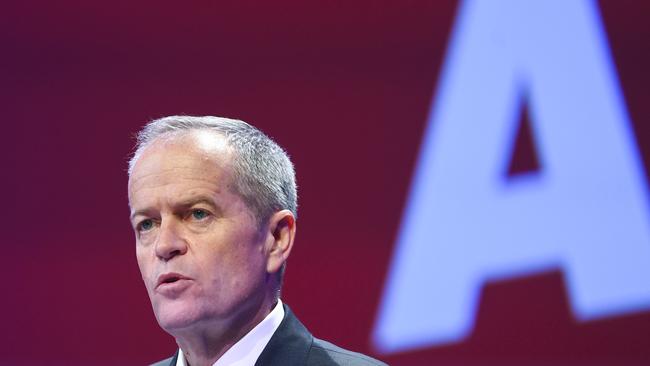
The price for Labor Party compassion is high. And compassion towards refugees is the trade-off the party demands to allow Bill Shorten to stop the boats.
Labor will bring 32,000 refugees to Australia annually in its offshore program when it is fully operational. The party is now moving onto the political offensive over refugees. The drums of compassion are beating across the waters. Labor will not tolerate keeping people on Manus and Nauru. It stands for more refugee numbers, huge funding increases for UNHCR regional programs, more pro-refugee diplomacy and more offshore medical removals.
The Labor compassion edifice rests upon a critical foundation — boat turnbacks to secure the borders. Labor is building an anti-Liberal compassion strategy on its declared conviction it will deny any restart of the smugglers’ trade.
There is a new article of Labor faith emerging from its national conference — that strong border protection fits with compassion to asylum-seekers and refugees. It is highly convenient, part delusional but pitches to public sentiment.
The conference pledges a generous welcome mat for refugees into Australia and an extraordinary $500 million over five years support to the UNHCR to deliver better resettlement processes across the region. This increase is four times greater than current funding that, projected over five years, would be $125m.
In his intervention at the national conference yesterday, Shorten, signalling a trade-off to secure party support to stop the boats, cast Labor as the party that was pro-refugee but anti-people smugglers.
Shorten offered a multipurpose summary of Labor’s refugee policy as “strong, compassionate and sustainable”.
Labor’s calculation is that Australian opinion wants a more compassionate pro-refugee stance. But this collapses completely if the boats reappear, thereby proving compassion and border security don’t fit together.
Labor has previously pledged to increase the refugee intake to 27,000 places annually by 2025. It has now agreed to expand this by increasing a separate category under the Community Sponsored Refugee Program to allow over time up to 5000 refugees to settle annually.
Under this program, state and local governments, community groups, unions and faith-based organisations can sponsor humanitarian entrants. This follows a similar model being run in Canada.
The current humanitarian intake under the Morrison government is 18,750 for 2018-19.
At a time when the immigration intake is being reduced, Labor proposes a significant increase in the refugee and humanitarian intake. This suggests a new debate — about refugee numbers, not just the way refugees arrive in Australia.
Shorten said a Labor government would accept the New Zealand offer to take 150 people annually from the offshore centres. If accepted when made in 2013, the offer would have meant that about 750 people would have gone to New Zealand from Manus and Nauru.
Shorten’s constant message is that “Australia can do better” on refugee support. The conference passed an agreed amendment seeking the priority removal of all people from Manus and Nauru to the US, New Zealand or third countries, but not Australia. Opposition immigration spokesman Shayne Neumann, said: “We will never let people languish in Manus and Nauru.”
He said a Labor government would restore the nation’s reputation on refugees and asylum-seekers. Labor is saying that with 25 million refugees worldwide Australia must play a greater role in tackling this crisis. Conference pledged to appoint a special envoy to negotiate third-nation resettlement agreements and an Australian Refugee Commission to advise the prime minister on refugee issues. The $500m for the UNHCR means Australia can determine how the funds are spent — the aim is to improve regional refugee settlement and ease the demand for people to come to Australia.



To join the conversation, please log in. Don't have an account? Register
Join the conversation, you are commenting as Logout